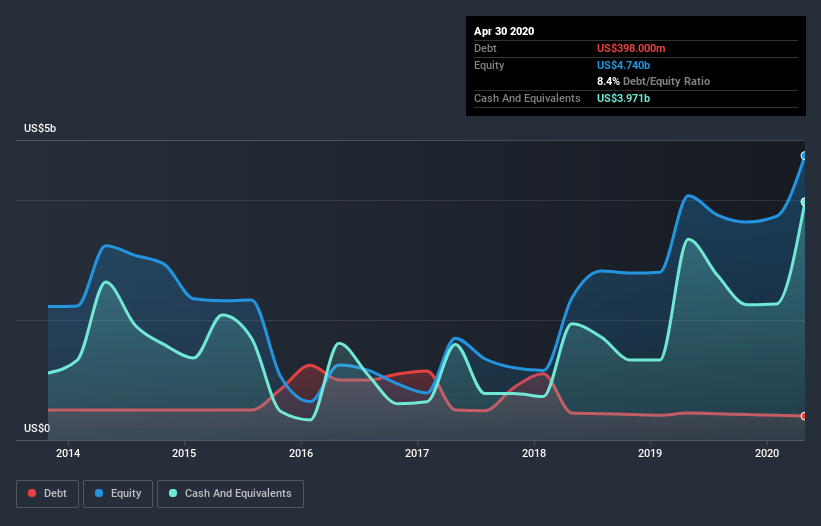Is Intuit (NASDAQ:INTU) A Risky Investment?

Howard Marks put it nicely when he said that, rather than worrying about share price volatility, 'The possibility of permanent loss is the risk I worry about... and every practical investor I know worries about.' So it might be obvious that you need to consider debt, when you think about how risky any given stock is, because too much debt can sink a company. We note that Intuit Inc. (NASDAQ:INTU) does have debt on its balance sheet. But the real question is whether this debt is making the company risky.
What Risk Does Debt Bring?
Debt assists a business until the business has trouble paying it off, either with new capital or with free cash flow. Ultimately, if the company can't fulfill its legal obligations to repay debt, shareholders could walk away with nothing. While that is not too common, we often do see indebted companies permanently diluting shareholders because lenders force them to raise capital at a distressed price. Having said that, the most common situation is where a company manages its debt reasonably well - and to its own advantage. When we examine debt levels, we first consider both cash and debt levels, together.
View our latest analysis for Intuit
How Much Debt Does Intuit Carry?
As you can see below, Intuit had US$398.0m of debt at April 2020, down from US$448.0m a year prior. But on the other hand it also has US$3.97b in cash, leading to a US$3.57b net cash position.
How Strong Is Intuit's Balance Sheet?
Zooming in on the latest balance sheet data, we can see that Intuit had liabilities of US$2.71b due within 12 months and liabilities of US$311.0m due beyond that. Offsetting this, it had US$3.97b in cash and US$314.0m in receivables that were due within 12 months. So it can boast US$1.26b more liquid assets than total liabilities.
This state of affairs indicates that Intuit's balance sheet looks quite solid, as its total liabilities are just about equal to its liquid assets. So it's very unlikely that the US$80.7b company is short on cash, but still worth keeping an eye on the balance sheet. Succinctly put, Intuit boasts net cash, so it's fair to say it does not have a heavy debt load!
But the bad news is that Intuit has seen its EBIT plunge 15% in the last twelve months. We think hat kind of performance, if repeated frequently, could well lead to difficulties for the stock. The balance sheet is clearly the area to focus on when you are analysing debt. But it is future earnings, more than anything, that will determine Intuit's ability to maintain a healthy balance sheet going forward. So if you want to see what the professionals think, you might find this free report on analyst profit forecasts to be interesting.
Finally, while the tax-man may adore accounting profits, lenders only accept cold hard cash. While Intuit has net cash on its balance sheet, it's still worth taking a look at its ability to convert earnings before interest and tax (EBIT) to free cash flow, to help us understand how quickly it is building (or eroding) that cash balance. Happily for any shareholders, Intuit actually produced more free cash flow than EBIT over the last three years. That sort of strong cash conversion gets us as excited as the crowd when the beat drops at a Daft Punk concert.
Summing up
While we empathize with investors who find debt concerning, you should keep in mind that Intuit has net cash of US$3.57b, as well as more liquid assets than liabilities. The cherry on top was that in converted 115% of that EBIT to free cash flow, bringing in US$1.9b. So we are not troubled with Intuit's debt use. Above most other metrics, we think its important to track how fast earnings per share is growing, if at all. If you've also come to that realization, you're in luck, because today you can view this interactive graph of Intuit's earnings per share history for free.
Of course, if you're the type of investor who prefers buying stocks without the burden of debt, then don't hesitate to discover our exclusive list of net cash growth stocks, today.
This article by Simply Wall St is general in nature. It does not constitute a recommendation to buy or sell any stock, and does not take account of your objectives, or your financial situation. We aim to bring you long-term focused analysis driven by fundamental data. Note that our analysis may not factor in the latest price-sensitive company announcements or qualitative material. Simply Wall St has no position in any stocks mentioned.
Have feedback on this article? Concerned about the content? Get in touch with us directly. Alternatively, email editorial-team@simplywallst.com.



